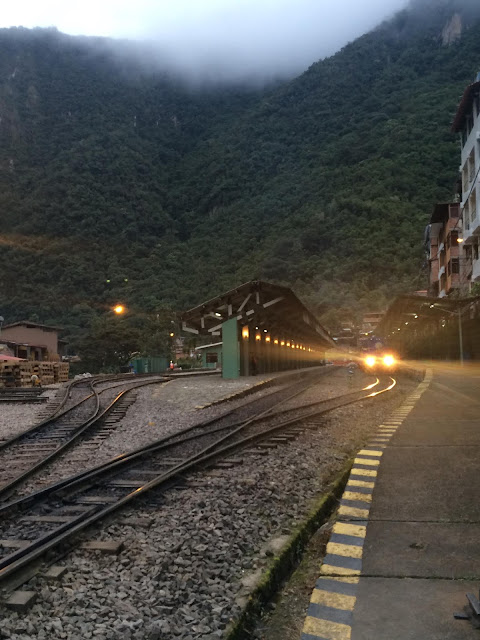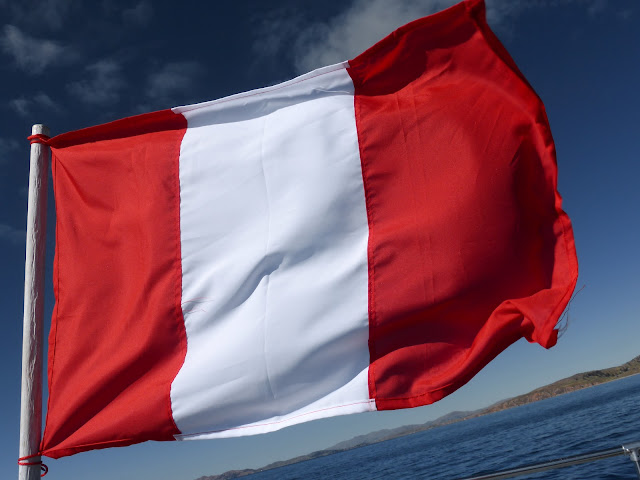Cusco (Peru) – Hidroelectrica (Peru) - Agua Calientes (Peru)
14 MAY 2015
There’s a danger to sitting on the back
of a minivan for 6-7hrs without having the security of your body functions. It
makes you desperately uneasy and ever vigilant as to the potential of
catastrophic events, because you know, the explanation never negates the act.
If you crap yourself or if you throw up, the people your immediate vicinity can’t
un-live that moment. No apologies and no degree of their understanding make
things ok. Whilst I laboured gallantly at the back of the minivan I tried to
hold off as best as I could.
The run from Cusco to Hidroeléctrica is a fair 6hr drive, mostly on asphalt but
when it hits the mountains then things get ‘oblique’. Roads become large pot
holed tracks and the once placid Peruvian driver that you met at 4am turns into
a wild gun totting cowboy that dices with the lives of his passengers at every
corner. A lot of the road is ‘sketchy’ and makes the ‘Camino de la muerte’ in
Bolivia look somewhat pedestrian. There are hair raising moments, places where
the road has been washed out or just slipped away.
I found this post from a guy named John Hastings, https://www.youtube.com/watch?v=1jon_eTobTU
This looked liked the right path!
Just had to make sure that we had a good lead time on the train - you don't want to be stuck in the middle with Peruvian rail lining you up from the other end!
Agua Calientes - Peru
Agua Calientes - Peru
The video is accurate of the manner in which the drivers take on
the conditions and also the nature of the track itself. Typically, as is the
case with me, instead of rocking the boat you kind of just hold your breath
like all the other tourists and ‘think’ everything will be ok, because this is ‘just
the way they do it’, but as John’s blurb professes, ‘…I wonder how many deaths
there have been in 2016 & 2017…for me this was worse than the Death Road in
Bolivia’. I can attest to the fact that he’s right on the mark.
Arriving to Hidroeléctrica briefs unsoiled and not so much as a
dry heave, I was feeling kind of cocksure about my place in the scheme of
things. In fact, even with a 45min Peru Rail cruise from Hidroeléctrica to Agua
Calientes at our fingers tips, Inga and I opted to take the more ‘scenic’ route
– also known as the ‘povo route’ via the rail tracks to the overnight stop.
No doubt, the jungle walk amongst the towering mountains and the
lush vegetation is a pleasant introduction. What you recognise over the ever so
gradual climb to Aqua Calientes is that no matter how hard you look, there are
no traces of the citadel that are readily visible. You really would never know
what existed 500m-700m above your head unless you specifically knew how to detect the clues.
For those wanting to know the $ count for this type of ride, I
can say that a return to and from Hidroeléctrica from Cusco was $30 AUD. From memory park entrance was $47 AUD and
overnight accommodation in an ordinary hostel was $30 AUD per night. For
something like $140 AUD you’ll be able to get in and back from Cusco, have
accommodation for 2 nights and obtain park entrance.
Surprisingly this is an attractive town.
I had visions of rabid tourist endeavours, harassing, cajoling and earnestly
disarming your resolute stance to not purchase anything tacky, but, there was
less of that than I imagined. In places its tranquil. Of course it bustles with
tourists and with 1500-2000 new entrants a day you feel its touristic pulse.
The town itself is has interconnecting
lanes, alleyways and bridges, all of which are taken up by restaurants, bars,
massage parlours and stores. The setting of this town on the slopes of these
mighty jungle peaks makes this entity unique in its own right.
Also we found that the hot springs are a
more than pleasurable sojourn for the afternoon. At the northern end of the
town are a number of hot baths that charge a minimal amount for access. Locals
and tourists alike make their way here at the end of a hard day of hiking, soak
their weary bodies and steal a brew or too.
So here we were, resting on the doorstep
of one of the great engineering accomplishments of humanity. This had been a
while coming for me. A false start five years earlier had stopped me in La Paz,
Bolivia when I was probably only a week away. Now all I had to do tonight was
sink a few hours of sleep, wake up at 4:00am and get cracking.











